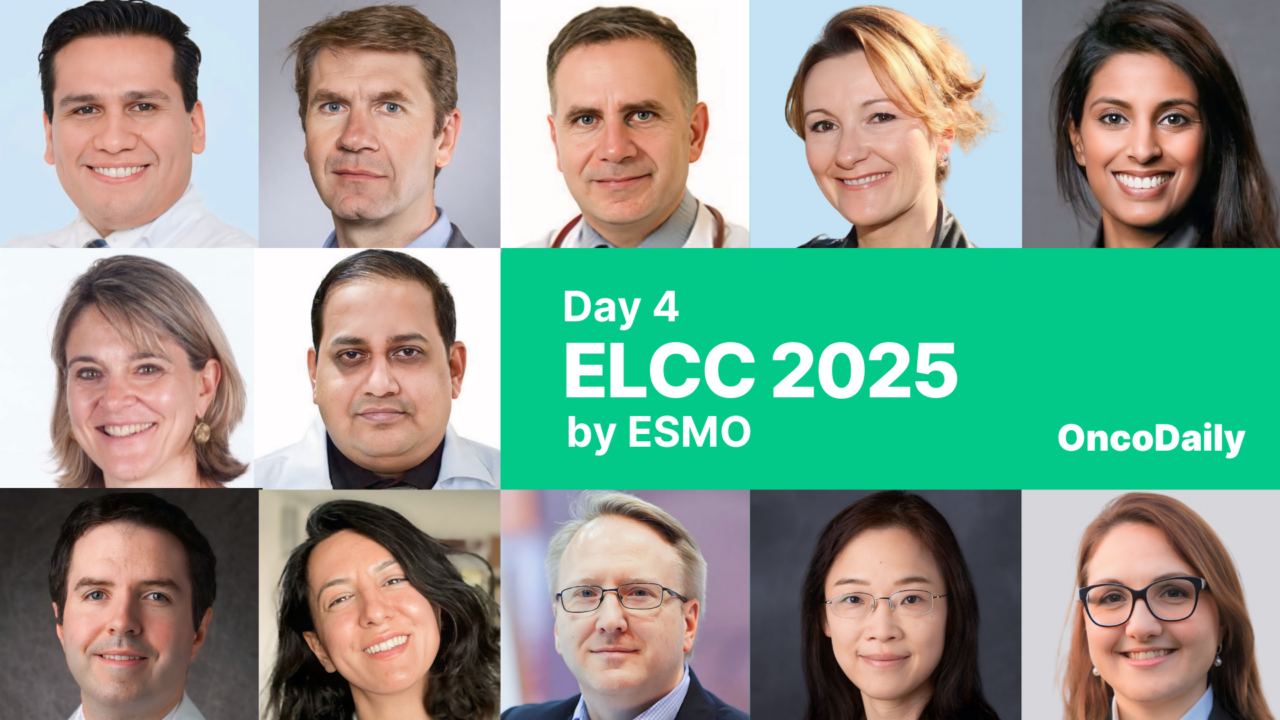The European Lung Cancer Congress (ELCC 2025) takes place in Paris from March 26-29, 2025, bringing together leading experts in thoracic oncology. Designed for medical oncologists, radiation oncologists, thoracic surgeons, pneumologists, interventional radiologists, and pathologists, ELCC offers a comprehensive program focused on advancing lung cancer research and improving clinical practice.
Many physicians and organizations have shared posts from Day 4 of ELCC 2025.
“ELCC25 saves the best for last!
Day 4 with two cutting-edge sessions focusing on IO resistance and next-generation ADCs. Happy to discuss the role of ADCs in oncogene-addicted NSC among bright colleagues and friends.”
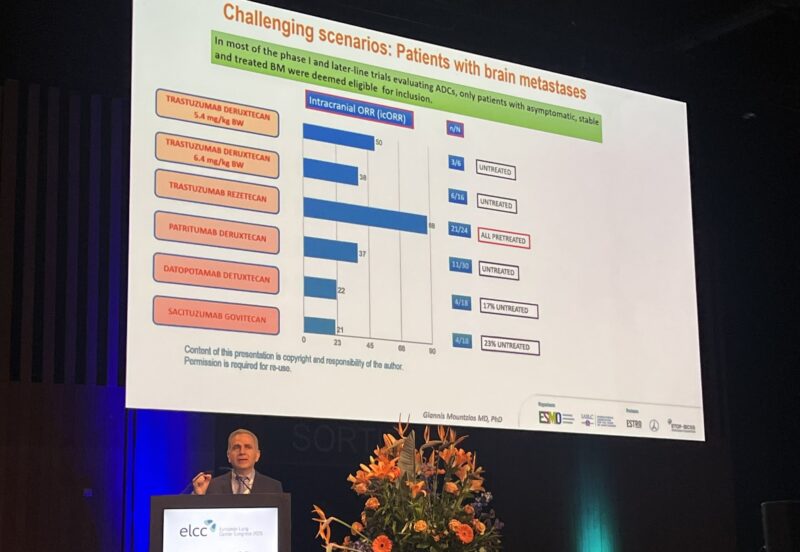
ESMO – European Society for Medical Oncology:
A new analysis presented at ELCC25 highlights the crucial complementary role of Patient-Reported Outcomes (PROs) and Clinician-Reported Outcomes (CROs) in NSCLC care. While CROs may show no major issues, patients may still be struggling with symptoms like fatigue or appetite loss, a gap that can only be revealed through PROs.
PROs and CROs are complementary: together they give us a fuller understanding of the patient’s experience.
Why does this matter? Integrating PROs into routine care helps identify issues that clinical tests might miss, enabling better communication, timely symptom management, and truly patient-centered care.
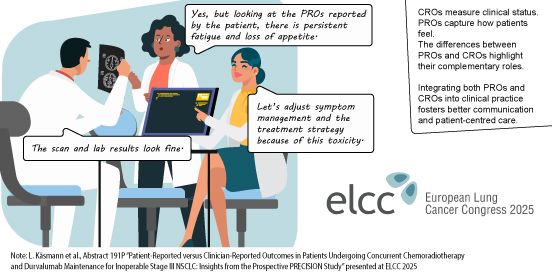
“Last brilliant and comprehensive talk by Roberto Ferrara on resistance to immunotherapy covering multiple strategies to overcome complex mechanisms of resistance. Towards perfect days?
What a session!”
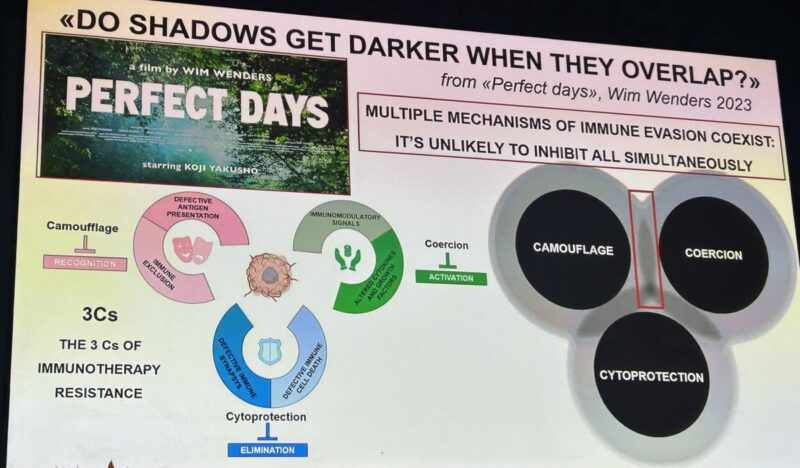
“ELCC25 ADCs in NSCLC
Excellent outline of the challenges of ADCs by Noemi Reguart:
- Biomarker evaluation,
- Toxicities,
- Penetrance of agent in TME.”
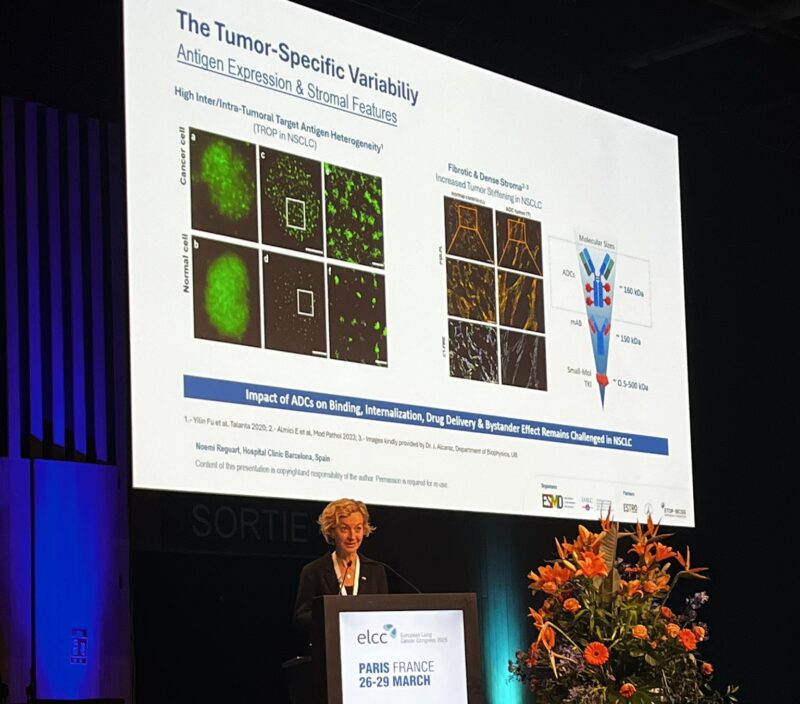
“An even more beautiful Butterfly flew this week at ELCC2025 as we reported the first results from the COCOON study. As this new butterfly emerged from its protective COCOON its colors were even brighter. Preventing adverse reactions, helping patients live better, and staying on treatment this new butterfly will bring more hope to patients and help doctors know how to help their patients.
Amazing work by Jairo Simões, Mehregan Nematian, Sean Murphy, Denise Kimball, Agnieszka Adamczyk, and the whole study team! And Julian Kam and Eric Y. Wong for flawless communications. 380 days from the first patient enrolled to the presentation is truly extraordinary. AND patient-centric to help patients live better and live well! Thank you everyone!”
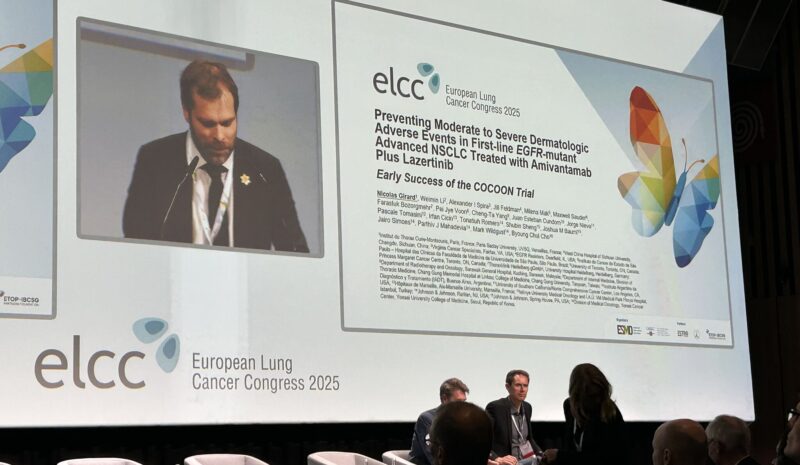
“Overcoming primary resistance to immunotherapy, big question.
How can we overcome the resistance? Is it possible? New drugs new resistance mechanism? Just keep thinking, keep searching! Great presentation by Roberto Ferrara.”
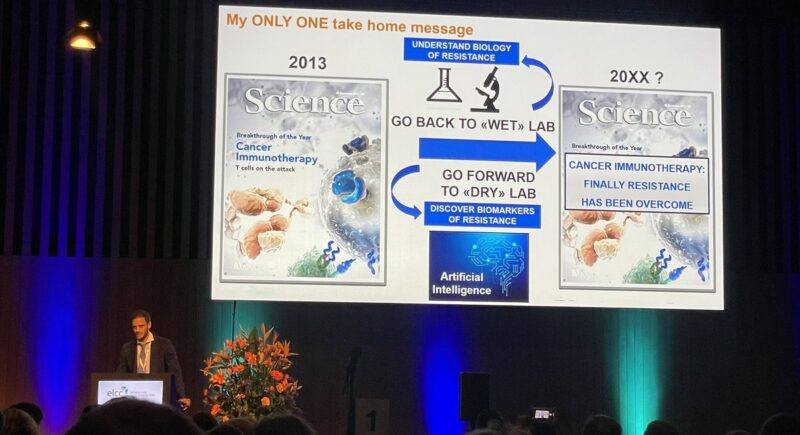
Alessandra Curioni Fontecedro:
“What a great ELCC2025!
We shared for the first time the findings from the cohort of patients with mesothelioma included in the SAKK17/18 trial:
- 2 years of research to find a synergistic combination for patients resistant to immunotherapy
- 4 Years of conduction and readout of the study
- 8 Centers involved in the study
The study met the primary endpoint:
- In a population of patients where 43% received prior =/>3 lines of therapy
- mPFS 5.6 mt, ORR13% (Indip. radiology review) mOS 9.1 mt
… and broad translational research projects to identify predictive markers.
This is just the beginning: For patients with mesothelioma we will continue pursuing new approaches
Thank you to all the patients who participated and their families, to SAKK, Swiss Group for Clinical Cancer Research, and to all colleagues involved in the study.”
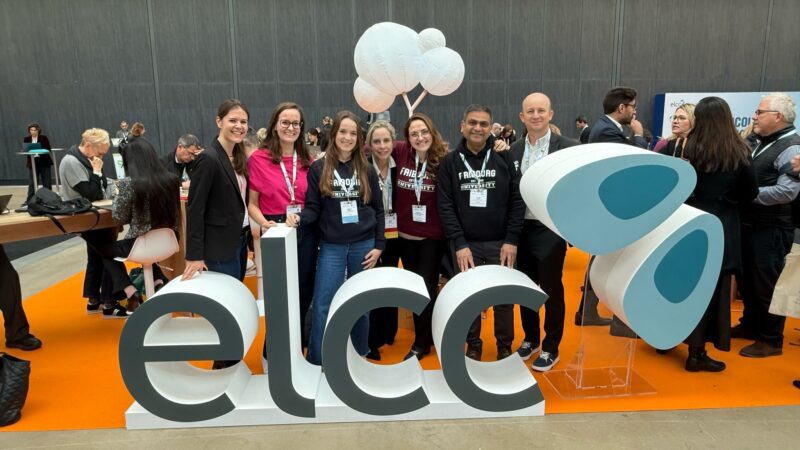
“Surgery vs SBRT. Age-old debate. Can IO add to SBRT? Nice conclusion summary of the current situation.”
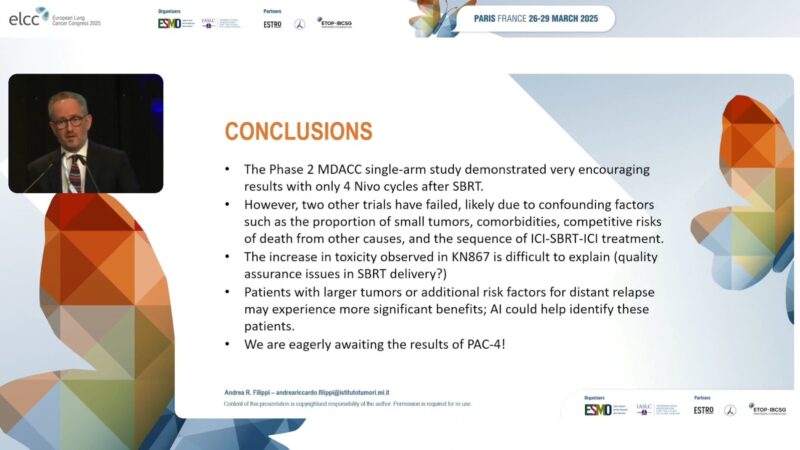
“A very successful ELCC25.
I presented Dato-DXd (4mg/kg vs 6mg/kg) with osimertinib in EGFR refractory NSCLC patients, from the ORCHARD trial.
mPFS is 11.7 months and ORR 36% in the Dato-DXd 6mg/kg cohort. Improving upon what we have and exploring new combinations.”
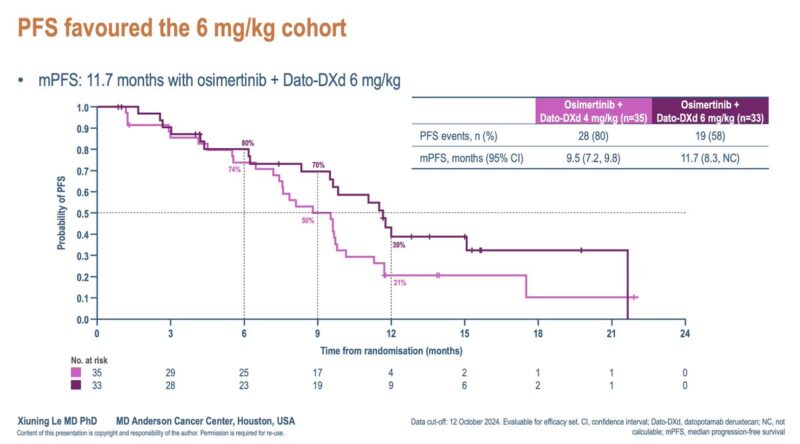
“Honored to moderate the session ‘Above RECIST: A new role for MRD and cfDNA in tumor assessment’ alongside Professor Thierry Berghmans at ESMO – European Society for Medical Oncology ‘European Lung Cancer Congress’ – ELCC2025 held in Paris, France, from March 26-29 2025.
I opened the session with a lecture on ‘Liquid biopsy: Principles and pitfalls for the clinician’ in the Plenary Room. I highlighted our work on Liquid Biopsy and Lung Cancer at the Recherche et Innovation – CHU de Montpellier. Thousands of participants were present!
This was followed by outstanding presentations by Thomas John (Melbourne, Australia), Atocha Romero (Majadahonda, Spain), and Heather Wakelee (Stanford, USA).
A truly enriching experience with great interest and enthusiasm around this emerging topic! 🌟
I met many friends and colleagues!”
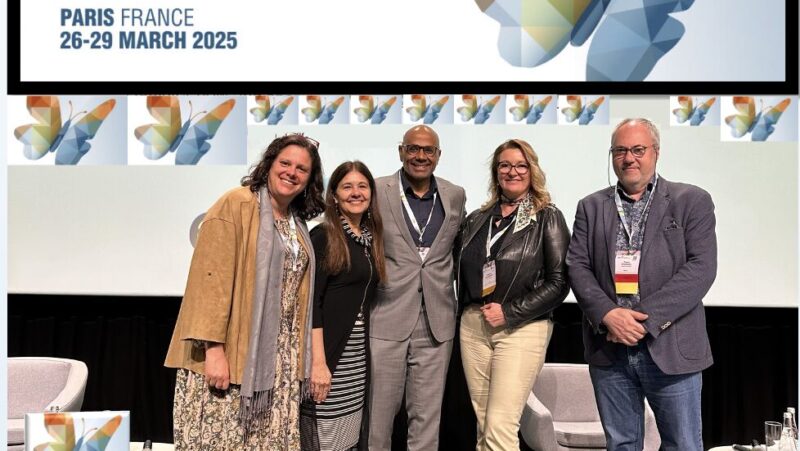
“In ADRIATIC, durvalumab after cCRT in LE-SCLC delayed time to CNS progression and reduced brain mets — even without PCI. Insightful data was shared by Dr. Suresh Senan at ELCC25. A new horizon for limited-stage SCLC?”
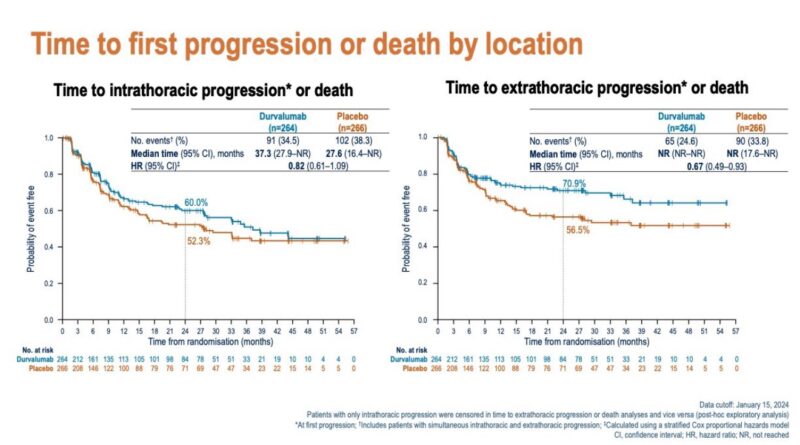
“Conclusion of Orchard study to chose DatoDxd 6mg/kg to move forward seems suspect to me. The 4mg/kg dose had much worse prognostic factors, slide below, I don’t think you can really make a comparison between them based on this cohort and 6mg looks worryingly toxic.”
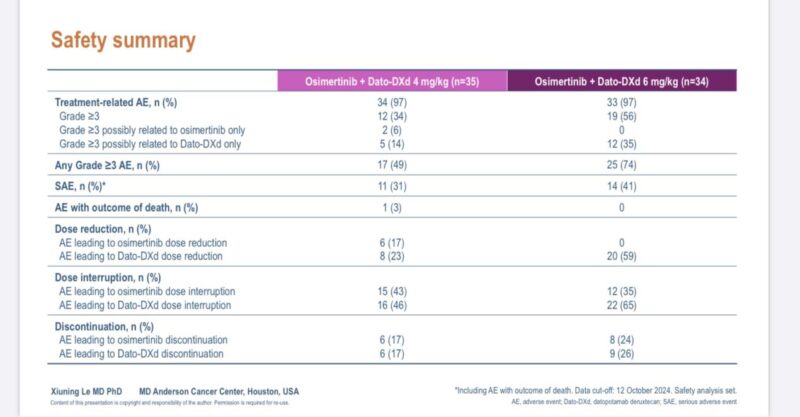
“Heterogeneity of resistance mechanisms should lead to a personalized strategy to overcome resistance. Great and subtle presentation by Laura Mezquita at ELCC2025.
‘Smart thinking’ > same treatment/sequence for all.”
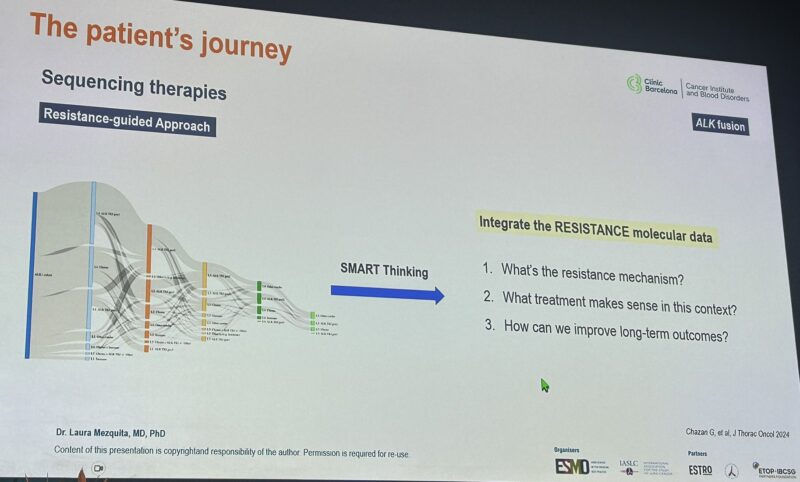
“At ELCC25, Benjamin Besse from Gustave Roussy delivered an amazing and inspiring presentation on the potential of treatment de-escalation in thoracic oncology.
While drug de-escalation strategies continue to gain traction, challenges—including limited research funding—still hinder their broader implementation. The primary goal of de-escalation is to spare patients unnecessary toxicity and reduce the burden of frequent hospital visits, with the potential added benefit of reducing treatment costs within our health systems.
Immunotherapy, particularly PD-1 and PD-L1 inhibitors, has been a major focus for de-escalation due to their pharmacokinetics, which allows flexibility in dosing. Three main approaches have been explored:
- Reducing treatment duration: Although PD-1/PD-L1 inhibitors are often prescribed for at least two years, retrospective studies suggest no clear benefit to continuing beyond this period. The DIAL trial (NCT05255302) is currently investigating whether stopping treatment after six months, with the option to reintroduce it upon progression, might yield similar outcomes.
- Extending dosing intervals: Trials such as the French PULSE study and the UK’s REFINE-Lung trial (NCT05085028) are evaluating whether immunotherapy can be given less frequently while maintaining efficacy.
- Lowering the dose: Some early studies suggest that much lower doses of certain immunotherapies may still provide clinical benefit, particularly in resource-constrained settings. However, cost savings depend on drug pricing models, which do not always align with dose reductions.
While these strategies hold promise, de-escalation must be grounded in strong biological rationale and tailored to each drug class.
So, what’s needed to move the field forward?
- Biomarker research to identify which patients can safely undergo de-escalation.
- Greater investment in de-escalation trials, as long-term cost savings could offset trial expenses.
- Regulatory adaptation to ensure evidence-based dosing changes are incorporated into guidelines.
Collaboration among researchers, clinicians, industry, and regulators will be key to making drug de-escalation a safe and effective reality. ”
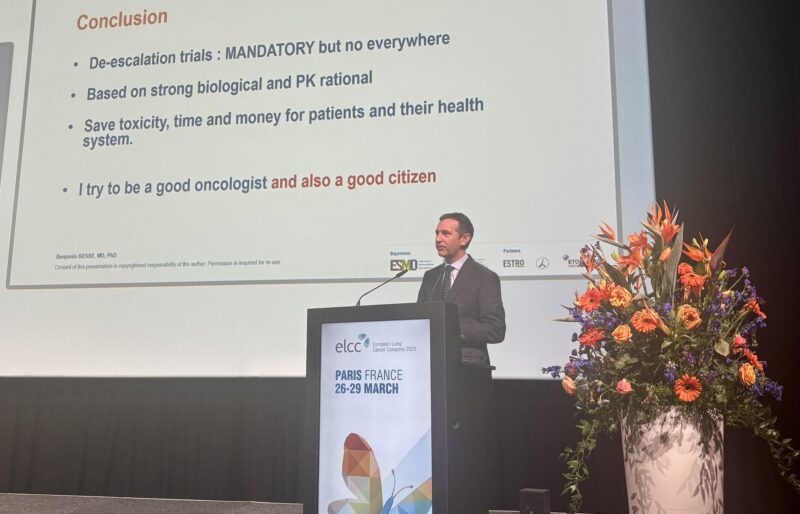
“The best way to end a most successful ELCC25: A recap of the best studies presented under the thoughtful insight of Drs Rafal Dziadzuscko, Jonathan Spicer, and Noemi Reguart. The final slides recap the essence of the Congress.”
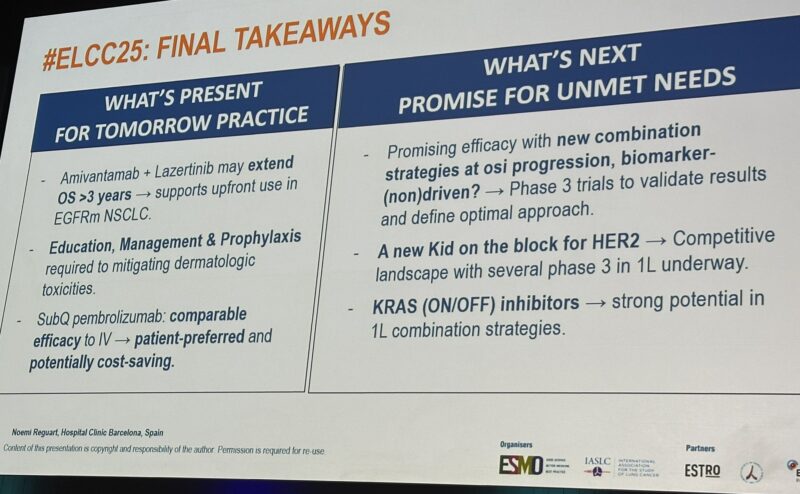
See also the highlights from ELCC 2025 Day 1, Day 2, and Day 3.


